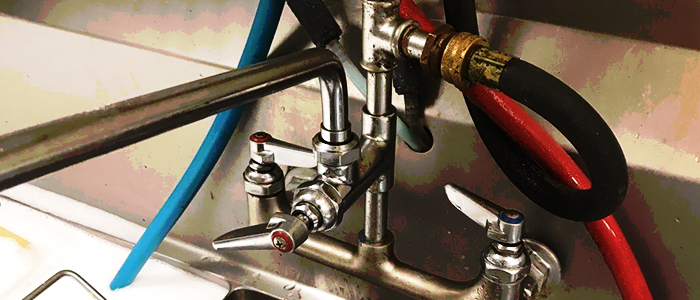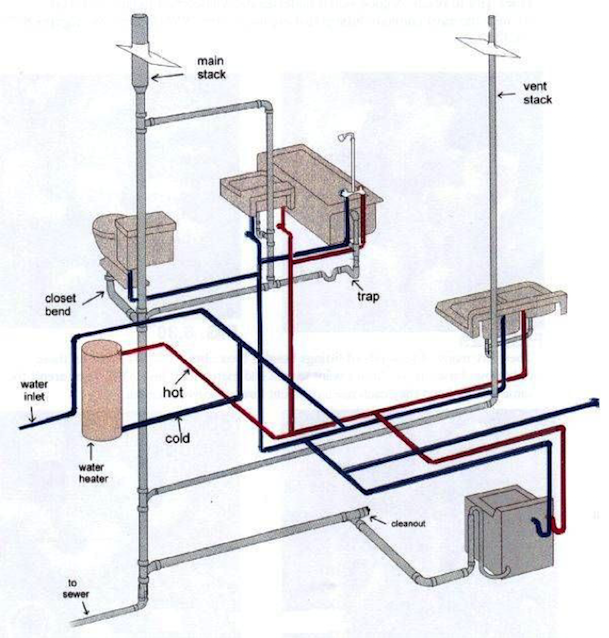Breaking Down Your House's Plumbing System Anatomy
Breaking Down Your House's Plumbing System Anatomy
Blog Article
In this article on the next paragraphs you can locate some sensible news concerning The Inner Workings of Your Home's Plumbing.

Understanding exactly how your home's plumbing system functions is essential for each house owner. From supplying tidy water for drinking, cooking, and bathing to safely getting rid of wastewater, a properly maintained plumbing system is essential for your family members's health and comfort. In this comprehensive guide, we'll check out the intricate network that comprises your home's plumbing and deal suggestions on maintenance, upgrades, and handling usual concerns.
Intro
Your home's pipes system is more than simply a network of pipelines; it's an intricate system that guarantees you have access to tidy water and effective wastewater elimination. Recognizing its parts and how they work together can assist you stop expensive repair services and guarantee everything runs efficiently.
Standard Components of a Pipes System
Pipes and Tubing
At the heart of your plumbing system are the pipelines and tubes that carry water throughout your home. These can be made from numerous materials such as copper, PVC, or PEX, each with its advantages in terms of toughness and cost-effectiveness.
Components: Sinks, Toilets, Showers, and so on.
Components like sinks, toilets, showers, and tubs are where water is utilized in your house. Recognizing just how these fixtures attach to the plumbing system helps in detecting problems and intending upgrades.
Valves and Shut-off Factors
Valves manage the flow of water in your plumbing system. Shut-off shutoffs are vital throughout emergency situations or when you need to make fixings, permitting you to isolate parts of the system without interrupting water circulation to the whole house.
Supply Of Water System
Main Water Line
The major water line connects your home to the municipal water supply or a private well. It's where water enters your home and is distributed to different components.
Water Meter and Stress Regulator
The water meter procedures your water use, while a pressure regulator makes sure that water streams at a secure pressure throughout your home's plumbing system, stopping damages to pipelines and components.
Cold Water vs. Warm water Lines
Understanding the difference between cold water lines, which supply water straight from the major, and warm water lines, which lug heated water from the hot water heater, assists in repairing and planning for upgrades.
Drainage System
Drain Water Lines and Traps
Drain pipes carry wastewater away from sinks, showers, and bathrooms to the sewage system or septic system. Traps protect against sewer gases from entering your home and additionally catch particles that could trigger blockages.
Ventilation Pipes
Ventilation pipelines permit air right into the water drainage system, protecting against suction that can reduce drainage and cause traps to vacant. Appropriate ventilation is vital for preserving the stability of your plumbing system.
Importance of Correct Water Drainage
Making certain correct water drainage protects against backups and water damage. Routinely cleansing drains and keeping traps can prevent pricey repair services and prolong the life of your pipes system.
Water Heater
Types of Hot Water Heater
Hot water heater can be tankless or conventional tank-style. Tankless heating systems heat water as needed, while tanks save heated water for immediate use.
Just How Water Heaters Connect to the Pipes System
Recognizing exactly how hot water heater link to both the cold water supply and hot water circulation lines helps in identifying issues like inadequate warm water or leaks.
Maintenance Tips for Water Heaters
Regularly flushing your water heater to get rid of debris, examining the temperature level settings, and checking for leakages can expand its life-span and boost energy effectiveness.
Usual Pipes Issues
Leakages and Their Reasons
Leakages can take place as a result of aging pipes, loosened fittings, or high water pressure. Attending to leakages promptly avoids water damage and mold growth.
Blockages and Clogs
Blockages in drains pipes and bathrooms are commonly brought on by flushing non-flushable items or an accumulation of oil and hair. Utilizing drainpipe screens and being mindful of what goes down your drains can avoid blockages.
Indications of Plumbing Issues to Look For
Low tide stress, slow-moving drains pipes, foul odors, or uncommonly high water bills are signs of possible pipes troubles that need to be resolved without delay.
Pipes Upkeep Tips
Regular Inspections and Checks
Schedule annual plumbing inspections to catch issues early. Search for signs of leaks, corrosion, or mineral buildup in faucets and showerheads.
Do It Yourself Upkeep Tasks
Easy tasks like cleaning faucet aerators, looking for commode leakages utilizing color tablet computers, or insulating exposed pipes in cool climates can avoid major plumbing concerns.
When to Call an Expert Plumber
Know when a pipes issue needs professional know-how. Attempting complicated fixings without proper expertise can result in even more damage and greater repair work costs.
Updating Your Pipes System
Reasons for Updating
Upgrading to water-efficient components or changing old pipelines can enhance water top quality, lower water expenses, and enhance the worth of your home.
Modern Pipes Technologies and Their Advantages
Explore technologies like clever leakage detectors, water-saving toilets, and energy-efficient water heaters that can conserve money and reduce ecological impact.
Price Factors To Consider and ROI
Determine the upfront expenses versus long-term financial savings when thinking about pipes upgrades. Several upgrades spend for themselves via decreased utility expenses and fewer fixings.
Environmental Effect and Preservation
Water-Saving Components and Appliances
Mounting low-flow faucets, showerheads, and commodes can significantly lower water use without sacrificing efficiency.
Tips for Lowering Water Usage
Straightforward habits like taking care of leakages quickly, taking shorter showers, and running complete lots of laundry and recipes can save water and reduced your utility expenses.
Eco-Friendly Pipes Options
Consider lasting plumbing products like bamboo for floor covering, which is durable and eco-friendly, or recycled glass for countertops.
Emergency Preparedness
Actions to Take Throughout a Pipes Emergency
Know where your shut-off valves are located and exactly how to shut off the supply of water in case of a ruptured pipeline or significant leakage.
Relevance of Having Emergency Contacts Handy
Keep get in touch with details for neighborhood plumbers or emergency services readily available for quick feedback throughout a pipes situation.
Do It Yourself Emergency Situation Fixes (When Relevant).
Short-lived solutions like using duct tape to spot a dripping pipeline or positioning a pail under a trickling faucet can reduce damage until a professional plumber arrives.
Conclusion.
Understanding the anatomy of your home's pipes system equips you to preserve it efficiently, saving time and money on repairs. By complying with routine maintenance routines and remaining informed about modern plumbing innovations, you can ensure your plumbing system operates efficiently for years to come.
Exploring Your Homes Plumbing Anatomy
Water Supply System
Main Water Line: This is where water enters your home from the municipal supply or a private well.
Water Meter: Typically located near where the main water line enters the property, it measures the amount of water used.
Shutoff Valve: It s crucial to know where this is in case of emergencies. It allows you to turn off the water supply to the entire house.
Pipes and Fittings: These distribute water throughout your home. Materials can include copper, PVC, or PEX.
Drain-Waste-Vent (DWV) System
Drains: Located in sinks, showers, and tubs, these carry wastewater away.
Traps: U-shaped pipes under sinks that hold standing water, blocking sewer gases from entering the home.
Vents: Pipes that lead from the DWV system to the outside, preventing vacuum formation and allowing gases to escape.
Sewer Line: Carries all wastewater from the home to the municipal sewer system or a septic tank.
Fixtures and Appliances
Sinks, Toilets, and Showers
Dishwashers and Washing Machines
Water Heaters
Maintenance Tips
Regularly check for leaks in exposed pipes and around fixtures.
Inspect the water heater annually for signs of wear.
Clean drains and traps to prevent clogs and odors.
Know how to shut off water to individual fixtures.
When to Call a Professional
Major leaks or burst pipes
Installation of new pipes or fixtures
Septic tank issues
Remodeling projects that involve plumbing changes
Conclusion
Understanding the anatomy of your home's plumbing is key to maintaining a functional and efficient system. Regular checks and knowing when to call in the experts can save you time, money, and stress.
https://www.mavyn.com/blog/exploring-your-homes-plumbing-anatomy

Exploring Your Homes Plumbing Anatomy
Water Supply System
Drain-Waste-Vent (DWV) System
Fixtures and Appliances
Maintenance Tips
When to Call a Professional
Conclusion
Understanding the anatomy of your home's plumbing is key to maintaining a functional and efficient system. Regular checks and knowing when to call in the experts can save you time, money, and stress.
https://www.mavyn.com/blog/exploring-your-homes-plumbing-anatomy
Do you appreciate more info about Anatomy of a House: Understanding the Components? Write feedback directly below. We will be glad to find out your views about this entry. In hopes that you come back again soon. In case you enjoyed reading our page kindly make sure you remember to pass it around. We thank you for your readership.
Schedule Appointment Now Report this page